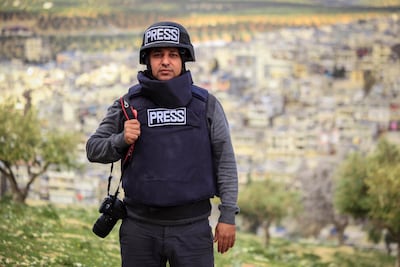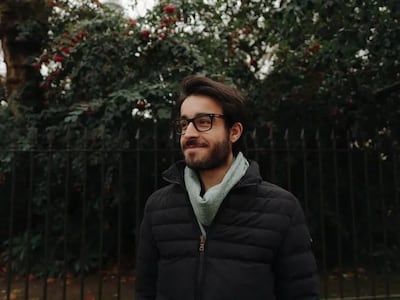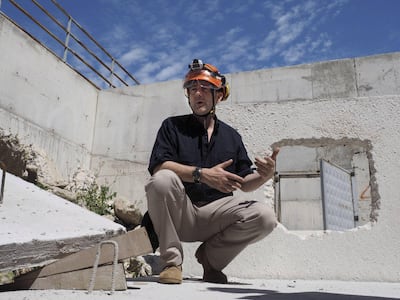Attempts to discredit the new Syrian administration have caused a surge in online disinformation, open source investigators in Syria have warned.
Since the fall of the Assad regime, an increase in videos containing false or misleading information about the new administration has been posted across social media networks. They include allegations of kidnappings, sectarian violence, hate speech and extremism.
Many posts aim to cast doubt on Syria's transitional leader Ahmad Al Shara, an Islamist with former associations with Al Qaeda, who has appointed members of Hayat Tahrir Al Sham to provisional government positions. Mr Al Shara, formerly known by the nom de guerre Abu Mohammed Al Jawlani, has repeatedly pledged an inclusive transition that would respect the rights of minorities.
One team of Syrians is working to establish the facts and uncover the networks behind the posting of fake news.
Mohamed Al Ali is an investigator with Verify-sy, an organisation that checks false information on social media channels related to Syria. Originally from Idlib, Mr Al Ali moved to Damascus last month when it became safe to do so after the collapse of the regime of former president Bashar Al Assad.
“We're finding videos taken of ISIS members in Iraq years ago, being shared again as though they'd happened in Syria this month. Some were scenes taken from movies,” he told The National.
Since the fall of the Assad regime, social media disinformation campaigns have become more sectarian, he said. “They're focused on minorities and sects,” he said. “Their aim is to continue the chaos and spread hate.Fake news spreads faster than real news, because it plays with people’s emotions and fears.”
On Thursday, a recent clip circulated that allegedly documented breaches committed by the new Syrian administration, including torture of opponents in barrels. However, the video was found to be from 2013 and showed the former Syrian army abusing people accused of collaborating with terrorists and selling weapons to its opponents.
A video of a Muslim cleric telling his congregation to hunt Shia and Alawites “like rats” was exposed as a fake. Another of an “army of Sunnis” in Damascus, was revealed to be a military parade in Adjabiya, Libya. Photos that claimed to show Kurdish graves being destroyed in north-east Syria by the new administration actually showed members of the Assad regime desecrating burial sites near Aleppo in 2020.
Online manipulators also claimed that HTS had blurred the footage of German Foreign Minister Annalena Baerbock when she met Al Shara last week, adding to public outcry after Syria’s new leader declined to shake her hand when they met last week. However, official government and state news accounts, now controlled by HTS, did not blur the footage.
Another widely circulated post claimed that a mosque was under construction in Damascus near two university departments as a result of the takeover of the city. Fact checkers, who went to the site, established that while a new prayer hall is indeed under construction, it was not a government project.
However, last week, Verify-sy said they believed a video alleging to show Syria’s new Justice Minister overseeing the execution of two women when he was a religious official in rebel-held Idlib a decade ago, was genuine.
Mr Al Ali lived in Damascus as a student until the revolution in 2011 and said found the city “depressed” where you "see the sadness on the streets". Having returned to the city he said that “people are still scared to speak out against the former authorities”.

New networks emerging
The posting of fake news comes as western governments seek to remove sanctions against Syria after the fall of the Assad regime.
Verify-sy aims to identify the main sources of disinformation across the country, but there are some clues. Many of the accounts amplifying the content are based in Iraq and Syria, suggesting they may be operated by Iranian-backed militias that are loyal to the Assad regime, while others are linked to Russia.
There is also a cohort of online influencers with pro-Russian and pro-Assad views who promote conspiracy theories about the conflict.
“Social media is being actively weaponised by external actors like Russia and Iran, who seek to exploit misinformation and sectarian narratives to destabilise the country, let alone the whole region,” said Zouhir Al Shimale, communications director at Verify-sy, who is London-based.
Most of the claims and videos in these accounts are “misrepresenting the facts,” he said. “They are using highly emotional and provocative massaging and content that dehumanise minority groups and accuse the new Syrian government of orchestrating such marginalisation and attacks against them.

“While there were violations that took place in the past month, which the government addressed officially, almost all other incidents are misleading and untrue.”
Other disinformation networks with large followings have gone dormant since the fall of the Assad regime. Mr Al Shimale said he had traced these back to a centralised network controlled by people close to the Assad regime and Russian influence operations.
“These networks primarily operated in the coastal parts of Syria but also all around Syria. It was a key tool for disseminating pro-regime content and attacking opponents of the Assad regime by framing them as terrorists or foreign agents,” he said.
These accounts could be reactivated at any time, and begin to merge with the new networks identified by Mr Al Shimale. He said the risks of this were significant.
“These networks have the infrastructure, follower base, and operational know-how to amplify disinformation campaigns on a large scale,” he said, adding they could “overwhelm” public debate in Syria, and “ultimately destabilise” attempts at social cohesion.
Fact checking undermined
The investigation into Syrian disinformation comes as social media network provider Meta announced it would end its fact-checking programme, in favour of a community notes system similar to X’s.
Meta’s chief executive Mark Zuckerberg said the move was aimed at “prioritising free speech”, in a decision made after the recent US elections. “So we're going to get back to our roots and focus on reducing mistakes, simplifying our policies and restoring free expression on our platforms,” he said.
However, critics describe the move as a “setback” for policing online disinformation. Mr Al Shimale said that Meta had given access to fact checkers with the tools to monitor disinformation. Without this, he feared that such organisations could become less effective in stopping fake news.
“We will be left to carry out the heavy lifting of tackling misinformation without the same level of external support,” he said.
This concern is widely shared. “This is a major set back for content moderation, at a time when disinformation and harmful content are evolving faster than ever,” said the Centre for Information Resilience, an organisation documenting war crimes in Sudan.
Earlier this year, Elon Musk tried to sue an online disinformation research centre which had reported on the increase in hate speech on X since Mr Musk’s takeover.
White Helmets

Russian-linked disinformation has been a tactic used in the Syrian revolution for years.
The White Helmets, a civil defence unit that gathered evidence of the use of chemical weapons and other war crimes during the conflict, became the targets of a widely spread online conspiracy theory claiming they were affiliates of Al Qaeda.
The false claim, peddled by Russian embassies, media outlets, online influencers from the far-left and an army of bots targeting fringe groups, made its way to western media outlets and the British parliament.
Its founder James LeMesurier had come under pressure from the campaign and took his own life in 2019.
Veteran Labour MP Dame Emily Thornberry – who now heads the government’s Foreign Affairs Committee – appeared to have bought into the conspiracy theory, when she cast doubt on the evidence that chemical weapons had been used in Syria in 2018.
“Relying on so-called open source intelligence provided by proscribed terrorist groups is not an acceptable alternative,” she told parliament, despite previous investigations asserting that chemical weapons had been used.
Ms Thornberry urged the international community to "not lose sight" of Syria's "diversity and complexity" in its support of Syrians building an inclusive settlement.
"As I have said many times in recent weeks, one of the wonderful things about Syria is its incredible diversity. That means there is a hugely complex web of groups and alliances," she told The National on Thursday.
"My view during the civil war was that groups and their alliances were very fluid. Getting to the root of what was happening was easily lost in the fog of war.
"I celebrate the fall of Assad and the heroism of those who stood up to him, including the White Helmets. Before important decisions about the future of Syria are made, we should have the discipline of relying on good-quality information to make them."
Mr Al Shimale described the emotional toll that such campaigns had on him. “It's not just a professional challenge; it's an emotional one, too. Watching communities you care about being manipulated, harmed, and divided can leave you feeling hopeless,” he said.

